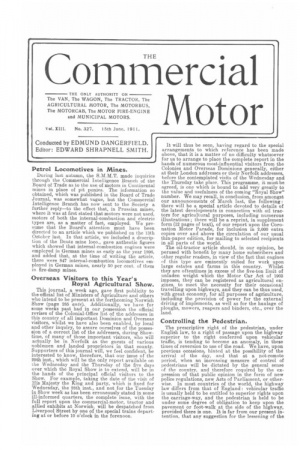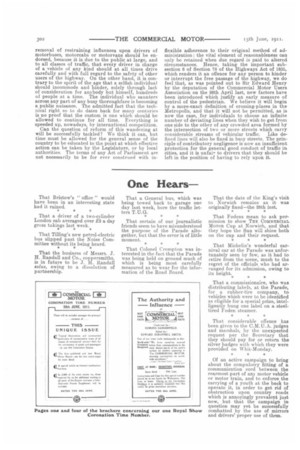Petrol Locomotives in Mines.
Page 1

Page 2

If you've noticed an error in this article please click here to report it so we can fix it.
During last autumn, the S.11/1.11.T. made inquiries through the Commercial Intelligence Branch of the Board of Trade as to the use of motors in Continental mines in place of pit ponies. The information so obtained, which was published in the Board of Trade Journal, was somewhat vague, but the Commercial Intelligence Branch has now sent to the Society a further reply—to the effect that, in Prussian mines, where it was at first stated that motors were not used, motors of both the internal-combustion and electric types are, as a matter of fact, employed. We presume that the Board's attention must have been directed to an article which we published on the lath October last. In that article, we included a description of the Deutz mine loco., gave authentic figures which showed that internal-combustion engines were employed in German mines as early as the year 1896, and added that, at the time of writing the article, there were 847 internal-combustion locomotives employed in German mines, nearly 50 per cent, of them in fire-damp mines.
Overseas Visitors to this Year's Royal Agricultural Show.
This journal, a week ago, gave first publicity to the official list of Ministers of Agriculture and others who intend to be present at the forthcoming Norwich Show (page 285 ante). Additionally, we have for some weeks past had in our possession the official revises of the Colonial-Office list of the addresses in this country of all important Dominion and Overseas visitors, whilst we have also been enabled, by local and other inquiry, to assure ourselves of the possession of a correct list of the addresses, during Showtime, of many of those important visitors, who will actually be in Norfolk as the guests of various noblemen and landed proprietors in that county. Supporters of this journal will, we feel confident, be interested to know, therefore, that our issue of the 29th inst., which will be the only report available on the Wednesday and the Thursday of the five days over which the Royal Show is to extend, will be in the hands of the principal official visitors to the Show. For example, taking the date of the visit of His Majesty the King and party, which is fixed for Wednesday, the 28th inst., and not for the Tuesday in Show week as has been erroneously stated in some ill-informed quarters, the complete issue, with the full report upon the commercial-motor, tractor and allied exhibits at Norwich, will be despatched from Liverpool Street by one of the special trains departing at or before 10 o'clock in the forenoon.
It will thus be seen, having regard to the special arrangements to which reference has been made above, that it is a matter of no difficulty whatsoever for us to arrange to place the complete report in the hands of numerous most-influential visitors from the Colonies and Overseas Dominions generally, either at their London addresses or their Norfolk addresses, before the contemplated visits of the Wednesday and the Thursday take place. This programme, it must be agreed, is one which is bound to add very greatly to the value and usefulness of the coming "Royal Show" number. We may recall, in conclusion, from amongst our announcements of March last, the following : there will be a special article devoted to details of the latest developments in connection with oil tractors for agricultural purposes, including numerous illustrations ; there will be a reprint, in supplement form (12 pages of text), of our report upon the Coronation Motor Parade, for inclusion in 2,000 extra copies over and above the circulation of our usual thin-paper edition, for mailing to selected recipients in all parts of the world. The oil-tractor article should, in our opinion, be perused with benefit by many home subscribers and other regular readers, in view of the fact that engines of this type are eminently suited for work upon large estates and farms in this country. Whilst they are oftentimes in excess of the five-ton limit of unladen weight which the Motor Car Act of 1903 imposes, they can be registered as agricultural engines, to meet the necessity for their occasional travelling upon highways, and they can be thus used, with great economy, for all purposes of agriculture, including the provision of power for the external driving of implements, as well as for the haulage of ploughs, mowers, reapers and binders, etc., over the land.
Controlling the Pedestrian.
The prescriptive right of the pedestrian, under English law, to a right of passage upon the highway superior to the right conferred upon vehicular traffic, is tending to become an anomaly, in these times of reversion to use of the road. We have, upon previous occasions, hinted at the possibility of the arrival of the day, and that at a not-remote period, when an increasing measure of control of pedestrians will be dictated by the general sense of the country, and therefore required by the expression of that public opinion in the form of new police regulations, new Acts of Parliament, or otherwise. In most countries of the world, the highway law differs from that of England : vehicular traffic is usually held to be entitled to superior rights upon the carriage-way, and the pedestrian is held to be under some degree of obligation to keep upon the pavement or foot-walk at the side of the highway, provided there is one. It is far from our present intention, that any suggestion for the lessening of the removal of restraining influences upon drivers of motorbuses, niotorcabs or motorvans should be endorsed, because it is due to the public at large, and to all classes of traffic, that every driver in charge of a vehicle of any kind should at all times drive carefully and with full regard to the safety of other users of the highway. On the other hand, it is contrary to the spirit of the age that a selfish individual should incommode and hinder, solely through lack of consideration for anybody but himself, hundreds of people at a time. The individual who saunters across any part of any busy thoroughfare is becoming a public nuisance. The admitted fact that the technical right so to do dates back for many centuries is no proof that the custom is one which should be allowed to continue for all time. Everything is speeded up, nowadays, by international competition.
Can the question of reform of this -wandering at will be successfully tackled ? We think it can, but time must be allowed for the general sense of the country to be educated to the point at which effective action can be taken by the Legislature, or by local authorities. The terms of any Act of Parliament are not necessarily to be for ever construed with in flexible adherence to their original method of administration : the vital element of reasonableness can only be retained when due regard is paid to altered circumstances. Hence, taking the important subsection 6 of Section 78 of the Highways Act of 1835, which renders it an offence for any person to hinder or interrupt the free passage of the highway, we do feel that, as was pointed out to Sir Edward Henry by the deputation of the Commercial Motor Users Association on the 26th April last, new factors have been introduced which justify an early measure of control of the pedestrian. We believe it will begin by a more-exact definition of crossing-places in the Metropolis, and that it will not be permitted, as is now the case, , for individuals to choose an infinite number of deviating lines when they wish to get from one side to the other of any crowded area formed by the intersection of two or more streets which carry considerable streams of vehicular traffic. Like defined lines will also be fixed in busy streets. The principle of contributory negligence is now an insufficient protection for the general good conduct of traffic in cities, and it is unfaie to drivers that they should be left in the position of having to rely upon it.




















